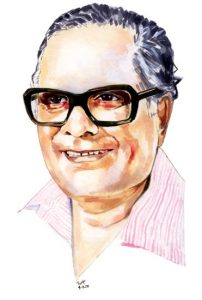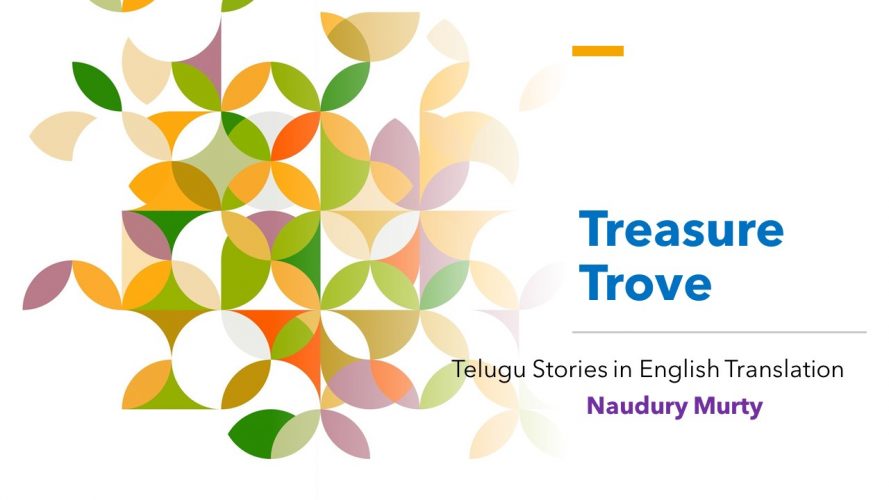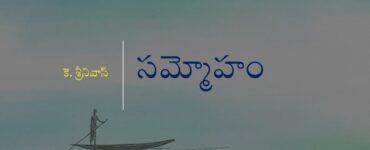 Telugu: Ravi Sastry
Telugu: Ravi Sastry
I was passing through tough times these days. My friend Reddy told me that a knowledgeable astrologer had come to the city. Of course, Reddy was going great guns. He needed no astrologer to know his future. He was ambitions to grow beyond the reach of people and faith in astrology to the same measure. Enough the person had a snack of knowledge of astrology, he was ready to present his horoscope for his study. Without fail, they would always identify and speak profusely about one or the other of the Raja Yoga[2]s in it. And true to their predictions, his life was also going without any hiccups. With that, I had developed faith in astrology.
Once we went to an astrologer together. Reading his horoscope, the astrologer put Reddy in seventh heaven. Reddy was immensely proud. But looking into my horoscope, he turned down his lips. After close study he did not hide his disappointment. Finally, he razed my future to the ground. Reddy was quite familiar with the ins and outs of my life. His realization that what the astrologer said about me was true had given him confidence that what he said about him could also be true. That made him happy. I noticed that. He was proud of himself. I understood even that.
I never lost faith in astrology. I am afraid faith in astrology lasts so long as hope lurks in him. Two or three astrologers spoke well of my horoscope. If someone said Venus was in a good house in my horoscope, Sun would be better placed in Reddy’s.
They say Sun is responsible for government positions. That means, he invests in the person with power. Confers rank and authority. But Venus confers sensual and sensuous pleasures. “Of what use is sensual pleasure without commensurate riches?” I asked him. He answered, “If Reddy gets a job with one lakh per month salary, you will get sensual pleasure with a woman possessing lakhs of money. Do you understand the difference?” I understood the difference. But the point to note is that the incumbent also wants the lakhs along with the woman. The sensual pleasure with the woman is one thing and the sensual pleasure with one lakh is a different thing.
When I could not get half a rupee to buy a Berkely cigarette packet, I really got angry with my horoscope. But, if any astrologer had said that my future would be better in such moments, I put great faith in that astrologer.
A long time back, I used to buy two-a-penny mark cigarettes. If I was going through the slivering by Saturn now a days, I was undergoing the rubbing of Rahu then. That was the first time I entertained the idea of showing my horoscope to some astrologer.
My mother was in the kitchen, dicing bitter gourd in the twilight of the evening.
“Mother! I think I should have my horoscope somewhere. Do you know where?” I asked.
“Yes, I know.”
“Then, can you give it to me? I heard a good astrologer came to our town and he reads the horoscopes for free.”
“Wait! Let me finish my work.”
By the time she finished her work it was quite dark. She scoured for my horoscope for some time and pulled out an old paper from a small box.
Giving it to me she said, “This is your horoscope. Go! And show it.”
I took it from her.
*
There are varieties of astrologers. If some sport unkempt beards, others look immaculate — cleanshaven. (For some time, I was holding an impression that the unkempt beards were better than the cleanshaven.) That astrologer had a clean face. He looked to have had some make up too. I had a feeling that he might have had a bath in the evening and applied some scent on him. He squatted on the green grass and under the clear view of the park-lights. He might be in his forties. At that time, I could hardly make the difference between forty and fifty-five. If the dhoti he wore was milk-white, the shirt he put on was Jalebi (honey-color). The Zari towel he wore was more like a garland of camphor beads. His face was as bright as the moon looking at the full-bloomed lotuses. And close to him, some aged, middleclass, lotuses (women) were sitting.
Reddy was not my friend, still, at that time. Appadu Pantulu, also known as Kondakarla Pantulu, who was two years senior in age and one year junior in studies, was my friend then. If I remember correctly, Chalapati Rao was the name of the astrologer. Though the astrologer was quite a bit older than him, Appadu moved close and on friendly terms with him. It was said the astrologer used to escort Appadu and his widowed sister home, after watching late-night movies in the theatre. Pantulu’s widowed sister had also developed an interest in reading horoscopes. She and Chalapati used to argue animatedly over horoscopes, and they enjoyed that. That the ill-aspect Mars (Kuja Dosha[3]) was solely responsible for her widowhood was the thesis of Chalapati. That it was Venus in Virgo (Neecha) who doomed her life and poor Mars had nothing to do with it, was her counter argument. Slowly, Appadu caught their interest in astrology. It was he who encouraged me to scout for my horoscope, get it from my mother and finally place it in the hands of Chalapati for his study.
Looking into my horoscope under the dull and faint light of the park, Chalapati declared, “Capital!” A twenty-four-month-old moon-like boy, then, wriggled out of the old lotuses sitting opposite, walked up to Chalapati and pulled his Zari towel. A lady, could be his maternal or paternal aunt, came running as her bangles, necklace and sacred thread jingled, picked up the boy saying endearingly “You, mischievous boy!”
hugged him and went back to join the group. I did not doubt Chalapati’s “Capital” then.
Chalapati said “Capital!” once more. Then asked, “What did you say your name? Venkata Satyam, isn’t it? Right! Then, Mr. Satyam, what do you want me to say about your horoscope? Come on, tell me?” he asked.
“Say whatever you read from it!” I replied.
“What exactly do you want? About your education? Money? A beautiful wife? Ha… ha… ha… tell me, what you want me to foretell?” he said, looking at me with a smile. He also cast that smile about the lotuses not far in front. In the meantime,
I sat thinking about the questions Chalapati had asked. What did I really want? Good education? Of course! Money? Of course! A beautiful wife?
Chalapati resumed, “Just love without marriage? Come on, tell man! … Madam! Leave the boy here. Hai, baby! What is your name? Who do you want? Me? Or her? The boy is cute and looks like Subhas Chandra Bose. Will you give him to me for adoption? You don’t want to give? No problem. Do you have his horoscope? Show it to me… I can read his entire life through it. I am not new to this place. I know you all. Aren’t you from Reddipilli Agraharam? Surappa is the elder sister of my mother-in-law. My wife is Venkappa’s daughter!”
There was a commotion in the group of old lotuses when they came to know Chalapati’s wife was Venkappa’s daughter. Chalapati got up, went there, and talked to his aunts, sisters-in-law, and nieces, promised them to meet them all in their place and returned to us after half an hour.
Some men make use of music and dance as a bait for women. Some others tempt them by flaunting their attire and riches. Some people write stories to lure them. Some people depend purely on the power of their youth for this purpose. I came to know later that Chalapati used his skill of reading horoscopes to win their favor. Everyone has his own baits. In our place, there was once a noted philosopher. Teaching Upanishads to the queen, he made her give-in to his carnal desires. That’s why I always felt that that when it comes to woman, all skills and philosophies lead only to bedroom; end up only on downy beds.
That day, after gleamingly returning from the lotuses, Chalapati spent some more time discussing with Kondakarla Pantulu without looking into my horoscope. Having learnt that all those old lotuses of Reddipilli village were also related to him through his widowed sister, my friend Appadu also went into a blissful mood. Lost in the eagerness to know what was in my horoscope, I remained aloof from their pleasant moods.
At last, Chalapati started reading my horoscope (under the park light). “By the way, my dear Venkatesam, you want to know when you are going to get a beautiful wife, isn’t it?” he said.
“Neither I am Venkatesam, nor did I ask you about my wife,” I said.
“Then, what did you ask me about? What do you want to know? Come on, come out!” Chalapati reiterated looking into my horoscope.
I was a bit embarrassed to ask about money and marriage. I also felt delicate to reveal I was going through hard times. After thinking about for a while,
“Tell me how long I am going to live?” I asked, putting up an innocent face.
“That’s a tricky question! Let me see,” he said. He looked into the chart deeply for some time, put down the paper, and said,
“My boy, you are immortal!” said Chalapati. “You live for a thousand years. How? Strong as a stone! If you are thrown into water, you won’t sink; thrown into fire, you won’t burn; you never suffer from even the commonest cold; you never get a fever; you don’t have to take medicine; if you were to be hit by an elephant, you won’t cry in pain! You live a hard, sturdy life!” explained Chalapati.
If he had said that I would live long enough, I might have been happy. But what is this ‘hard-as-stone’ life? It did not forebode me well. It did not sound like a great Yoga. But what could anybody do? If ‘living’ itself had become a challenge, what would it matter whether you live like a stone or a flower?
With all that, Chalapati’s assurance that I would live for a thousand years did not make me happy. On second thoughts, I wanted to know about the level of my education, and about my employment.
“Sir! Tell me about my level of education!” I asked, sitting on my calves, and embracing them with my arms.
Chalapati held my horoscope tightly between his thumb and forefinger and looked very seriously into it. As though I had disturbed him, he admonished me impatiently, “Wait!”
“Wait, man! Let him study carefully,” censured Konda Karla Pantulu.
The admonition of Chalapati and censure of Pantulu so frightened me that I thought I made a great offense and kept quiet waiting to hear what he was going to say…
Still looking into my horoscope Chalapati asked, “What’s your name? Venkatesam or Venkata Satyam?”
My friend Pantulu informed him that I was only Venkata Satyam and not Venkatesam.
“When were you born? Dundubhi[4]. Isn’t it? Right! Eleventh day of the bright fortnight of Sravana of Dundubhi!” announced Chalapati.
I did not make out anything of what he had said. I looked at Pantulu enquiringly.
“He is telling when you were born. He says you were born in Dundubhi,” clarified Pantulu.
“I was born on twenty-second August Nineteen twenty-two,” I said apologetically. I can’t say why I was apologetic.
“As per English Calendar, it comes to that only,” clarified Pantulu.
Cutting the conversation between Pantulu and me, Chalapati broke out from my horoscope.
“Satyam! What is your father doing now?” he asked, leaning towards me gently, adjusting his dhoti while changing his sitting posture.
“He never knew his father. He ‘kicked the bucket’ long ago,” answered Pantulu.
Chalapati flashed a victory smile. “That was the reason why I asked, my boy!” he declared triumphantly.
“When did he die? Let me tell you. He must have expired before you were one-year old,” said Chalapati.
I was really surprised! He was on the spot. I was six-months old when he died.
Suddenly, my respect and awe towards him doubled up. I admitted that what he read in my horoscope was perfectly correct.
Looking towards Pantulu, sporting a teasing smile, and tossing his head, he played, “narananapnanaa… naarana nanna nanaa… nara nana… nannaanana…” and throwing my horoscope towards Pantulu with the tips of his fingers.
He challenged him, “Tell me, Pantulu, how I guessed it?”
I peeped into the paper Pantulu was looking at. That old paper which concealed behind its letters and between its lines all the secrets of my life, including the death of my father, frightened me. Who knows how many more deaths it hid in its folds!
Chalapati and Pantulu discussed about the reasons for my father’s death as per the chart for great length of time. Chalapati detailed to Pantulu how Mars had annihilated his brother-in-law and how some other planet (I don’t remember it now) had felled my father. The two discussed about the planet responsible for the death of my father as scientifically as the doctors at the central hospital would discuss the reasons for the death of different patients.
After a while Chalapati asked, “What more do you want Mr. Satyam?”
I was tempted to ask if my mother would live for a thousand years. But fearing that he might answer in the negative, I refrained.
For a long time, Chalapati studied my horoscope and made many predictions which I could not recall now. I think he had told me that I would become an engineer. I just worked as a clerk in an engineering office. I remember he said that I would get married at twenty-five and my wife would die young. I should in fact have married my uncle’s daughter when I was twenty-five. But it was rumored that my uncle said, “I will marry my daughter to any useless fellow but to him.” I did not understand why he said “to any useless fellow” to this day. However, not long after, my uncle’s daughter died of typhoid. I was not married for another ten years to come. Chalapati said that I would have nine children. I would have had! Of the three born so far, one boy had died. Only two daughters were alive. Who could tell how many more children I would have or how many of them would survive in the future? Different astrologers gave different figures about the number of children.
I did not exactly remember what Chalapati said that day. But what I clearly remembered was that I would lead a very average life. He left me in a gloomy mood. The only encouraging thing he said was, “Come what may, you will never beg for anything from anybody!” I was happy about that.
That night it was nine by the time I returned home from the park. “Mother! Here is the horoscope,” I said with despair, putting the paper on my mother’s trunk box.
It was then she said that it was not my horoscope. It belonged to another Venkata Satyam’s, the son of my father’s elder brother. He was one day older than me. While I was born on the twelfth day of bright fortnight of Sravana, he was born on the eleventh day of the waxing moon in Sravana. “I got confused as the names were the same,” my mother said apologetically.
My father’s elder brother became an ascetic and died in our house. And his son Venkata Satyam was burnt to death when he was only six months old. The tape-cot on which he was sleeping caught fire from the coals kept beneath to keep his bed warm.
I heaved a sigh of despair thinking of Venkata Satyam’s death and the state of my living. And I had been as desperate as I was then. “Come what may, you will never beg for anything from anybody!” said Chalapati that day! I wish at least that prediction were true. But when I recalled that the prediction was not my horoscope, I was seized with fear again. And I couldn’t help feeling that the boy who died of burns in his sixth month was more fortunate than me!
*
[1] Jataka in Telugu means horoscope. To retain the intended pun of the original writer, the title is left as it is.
[2] Raja Yoga in a horoscope, or birth chart, is a favorable combination/ positioning of planets in the houses which is supposed to augur a great future to the individual.
[3] Kuja Dosha, according to astrology, is an unfavorable positioning of Mars in the birth chart. Aspect and unfavorable positioning of Mars in one’s horoscope is supposed to delay marriage/ cause marital disharmony.
[4] Dundubhi is one of the sixty years in the cyclic calendar.









Add comment